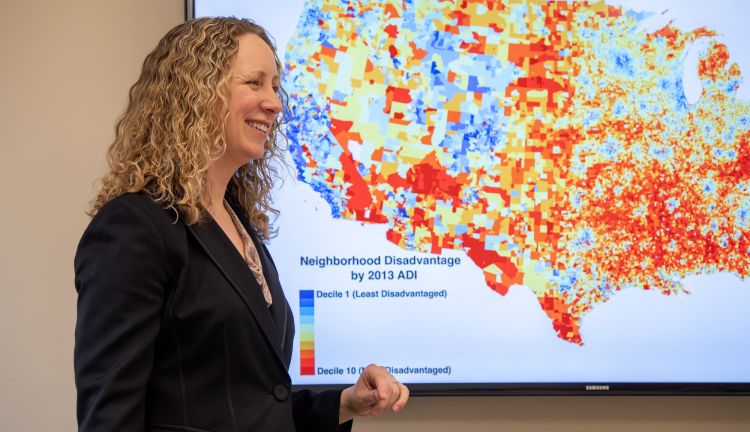UW launches innovative Center for Health Disparities Research

A new center at the UW School of Medicine and Public Health, led by Amy Kind, MD, PhD, associate professor, Geriatrics and Gerontology, seeks to examine how a person’s environment and social conditions impact their health down to the molecular level.
The new research effort, called the UW Center for Health Disparities Research (CHDR), launched in April. As its name implies, center investigators will focus on how physical environment and social conditions intersect to influence an individual’s health. Researchers will aim to identify new therapies, precision medicine approaches and other interventions, according to Dr. Kind.
“UW–Madison is deeply committed to advancing research towards the elimination of health disparities,” she said. “To do this, we need to understand why disparities happen – get to the roots of their mechanisms.”
An initial centerpiece of the center is The Neighborhood Atlas, which Kind developed in 2018 to examine the health impacts of physical and social environment to the neighborhood level. To date, the Atlas has been accessed more than 250,000 times. The data have been used by health systems, policy makers, researchers, and industry leaders to guide real world decisions, including the targeting of COVID-19 vaccination allocations across a number of states as a means to mitigate disparities, Kind said.
The center’s primary offices will be located at University Hospital in Madison, but it is organizationally housed in the UW School of Medicine and Public Health. The center will also be led by deputy director Barbara Bendlin, PhD, associate professor, Geriatrics and Gerontology, and Andrea Gilmore-Bykovskyi, PhD, RN, deputy director, and assistant professor at the UW–Madison School of Nursing.
The center will involve collaboration across UW–Madison researchers, involving expertise from faculty and staff in institutes, schools and departments across the campus.
Neighborhood Study
The center’s first major initiative will be a national effort called “The Neighborhood Study,” which is funded by a new $28.5 million grant from the National Institutes of Health awarded to UW–Madison and led by principle investigators Kind and Bendlin.
Using data from 22 Alzheimer’s Disease Research Centers throughout the United States, CHDR will examine how social determinants of health throughout a person’s lifetime impact their brain health.
The grant will allow the center to hire 30 new employees to tackle this pioneering research endeavor.
This funding is one of the largest grants of its kind ever awarded to university researchers. The fact that the leadership team is comprised of women is particularly meaningful, according to Kind and Bendlin.
“This is so important for the field of science to show the public what we’ve always known – that women can lead the most advanced research in the world,” Kind said. “We want girls and young women to see this and think, ‘I too could do this; that could be me.’”
In a U.S. Senate hearing on May 26, 2021, Wisconsin Senator Tammy Baldwin brought up the CDHR in a discussion about health disparities. Watch starting at 1:55.21.
Author: Emily Kumlien, UW Health
Banner: Amy Kind, MD, PhD, director, Center for Health Disparities Research. Credit: Clint Thayer/Department of Medicine